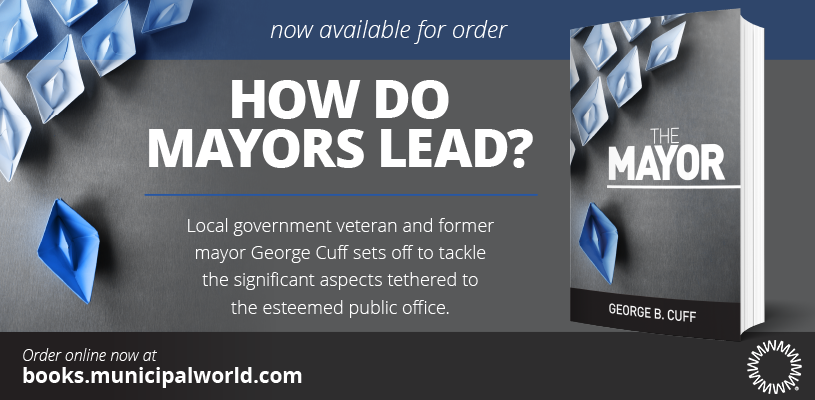Municipal funding, homelessness, emergency preparedness top FCM discussions
 Federation of Canadian Municipalities CEO Carole Saab addresses delegates on the opening day of the organization’s 2024 conference, held recently in Calgary. Photo: FCM YouTube
Federation of Canadian Municipalities CEO Carole Saab addresses delegates on the opening day of the organization’s 2024 conference, held recently in Calgary. Photo: FCM YouTube
The annual conference of the Federation of Canadian Municipalities (FCM) wrapped up last week, bringing together more than 3,100 attendees and delegates from over 2,000 Canadian municipalities together in Calgary.
“I am amazed by the record-breaking turnout at this year’s annual conference, which undeniably shows our leaders’ strong dedication to engaging with and addressing the concerns of Canadians,” said Geoff Stewart, incoming FCM president and deputy mayor of the County of Colchester, N.S.
This year’s conference was themed “Redefining Our Future.” Among the issues top of mind for many delegates were the challenges associated with tackling homelessness, funding shortages, and emergency preparedness as Canada enters wildfire season.
“Delivering on the things people so desperately need and deserve is getting harder,” said FCM CEO Carole Saab. “We know, and Canadians know, that the status quo isn’t working. While municipalities are still supporting millions of people every day, this is despite the many hurdles you face.”
Federal Leaders Address Conference
Prime Minister Justin Trudeau, federal NDP leader Jagmeet Singh, and Green Party of Canada leader Elizabeth May all addressed the conference.
In a meeting with the Big City Mayor’s Caucus (BCMC), Trudeau said the federal government has been “stepping up on cities.” He added that the government was “putting huge amounts of money on the table to change the way housing is built across [Canada]” and working to make sure cities continue to be welcoming places, particularly for young people.
In her remarks, May called for more equitable collaboration between different orders of government to tackling the challenges communities are facing.
“We have to rethink how confederation works,” May said. “Greens want … federal, provincial and territorial, local government, and Indigenous governments at the same table so we have policy coherence and policy alignment.”
May also used her remarks to comment on another significant event that occurred in Calgary. Just a day before the FCM conference kicked off, a major water main ruptured, causing considerable disruption to Calgary’s water supply. Mayor Jyoti Gondek said up to 60 per cent of the city’s water supply was impacted. Water use restrictions in Calgary remain at Stage 4 – the highest level.
“A major water main had a catastrophic failure in the city of Calgary – we’ve been talking for how long about aging infrastructure, about deferred maintenance, about not having adequate funding,” May said. “What are the chances of the largest conference that the Federation of Canadian Municipalities has ever had is happening in a city that just had aging infrastructure collapse to the point that they may run out of water.”
Municipal Growth Framework
Finding ways to advocate for better municipal funding was a focus point for many delegates. FCM is pushing for a new Municipal Growth Framework, which the organization says will provide a new way to empower municipalities to successfully withstand the challenges they face.
The framework was launched at FCM’s 2023 conference in Toronto. It calls on the federal government to reform municipal finances and modernize municipal funding. FCM wants that to be done by:
- increasing direct annual transfers to municipalities by $2.6 billion
- linking federal transfers to economic growth by indexing them to GDP
- broadening eligible expenses under federal transfers to include operating and capital costs to allow municipalities direct funding toward local priorities that enable population growth and economic development
Stewart said municipalities nationwide are striving to improve the quality of life of their residents and maintain essential services. However, they struggle to fund these services due to an outdated revenue framework.
“FCM is advocating for a new Municipal Growth Framework to empower municipalities with more equitable revenue tools,” Stewart said. “The federal government needs to convene a meeting with all orders of government to make visionary decisions for a more sustainable future for all Canadians.”
Reducing Homelessness
The Municipal Growth Framework also calls for a comprehensive plan to end chronic homelessness in Canada.
“Municipalities have had immense responsibilities downloaded to them to address homelessness in their communities,” the framework report states. “The human cost and financial burden of Canada’s homelessness crisis make it one of the most acute policy challenges facing Canada today.”
The framework calls for a comprehensive plan to end chronic homelessness that identifies the roles and responsibilities of each order of government, presents a timeline with clear milestones, and includes:
- co-ordinated investment and policy measures to increase the supply of non‑market housing and prevent people from falling into homelessness
- new investment in supportive housing through a housing-first approach with costs shared between federal, provincial, and territorial governments
In his comments, Singh echoed that call for a housing-first approach.
“The first thing you need to do is get someone in a home. Then, and only then, can you help them with rehab or treatment of an illness or other mental health issues. People need a home first and foremost,” he said.
New FCM Board Elected
In addition to a new president, delegates elected new members to FCM’s Board of Directors and its three vice-presidents:
- First Vice-President: Rebecca Bligh, Councillor, City of Vancouver, B.C.
- Second Vice-President: Tim Tierney, Councillor, City of Ottawa, Ont.
- Third Vice-President: Kathy Valentino, Deputy Mayor, City of Thompson, Man.
London, Ont., Mayor Josh Morgan officially assumed the role of chair of BCMC. He succeeded Halifax Mayor Mike Savage, who’d led the caucus since 2021 and is not seeking re-election this fall. BCMC brings together representatives from 23 of Canada’s biggest cities to advocate and develop policy on a range of issues affecting the country’s large urban areas.
“It’s no secret these are challenging times for municipalities, but I maintain total confidence in our ability to make lasting and generational change in areas that have the greatest impacts for our residents,” Morgan said. “We have well-articulated and innovative solutions to our biggest national challenges, and I look forward to engaging with federal leaders on how best to partner to improve quality of life for Canadians.”
Winnipeg Mayor Scott Gillingham was also elected as BCMC vice-chair, succeeding Saskatoon Mayor Charlie Clark, who is also not seeking re-election this fall.
Saab lauded the leadership and dedication of Savage and Clark, alongside Montreal Mayor Valérie Plante, for having been instrumental in securing landmark federal support for infrastructure, public transit, climate adaptation, and housing and homelessness. These efforts, Saab added, will benefit all Canadians in communities large and small.
Reflecting on his own board position, Stewart said he is honoured by the opportunity to serve as FCM’s president. He was quick to add he looks forward to the opportunities in front of municipalities.
“With municipalities increasingly recognized as a foundational, nation-building order of government, we must continue to deliver local solutions to national challenges,” Stewart said. “In the coming year, I look forward to exploring with our members what new tools they need to shape tomorrow’s Canada.” MW
✯ Municipal World Executive and Essentials Plus Members: You might also be interested in Dr. Enid Slack’s article: Are Canadian cities fiscally sustainable?
Ibrahim Daair is staff writer at Municipal World.
Related resource materials:



